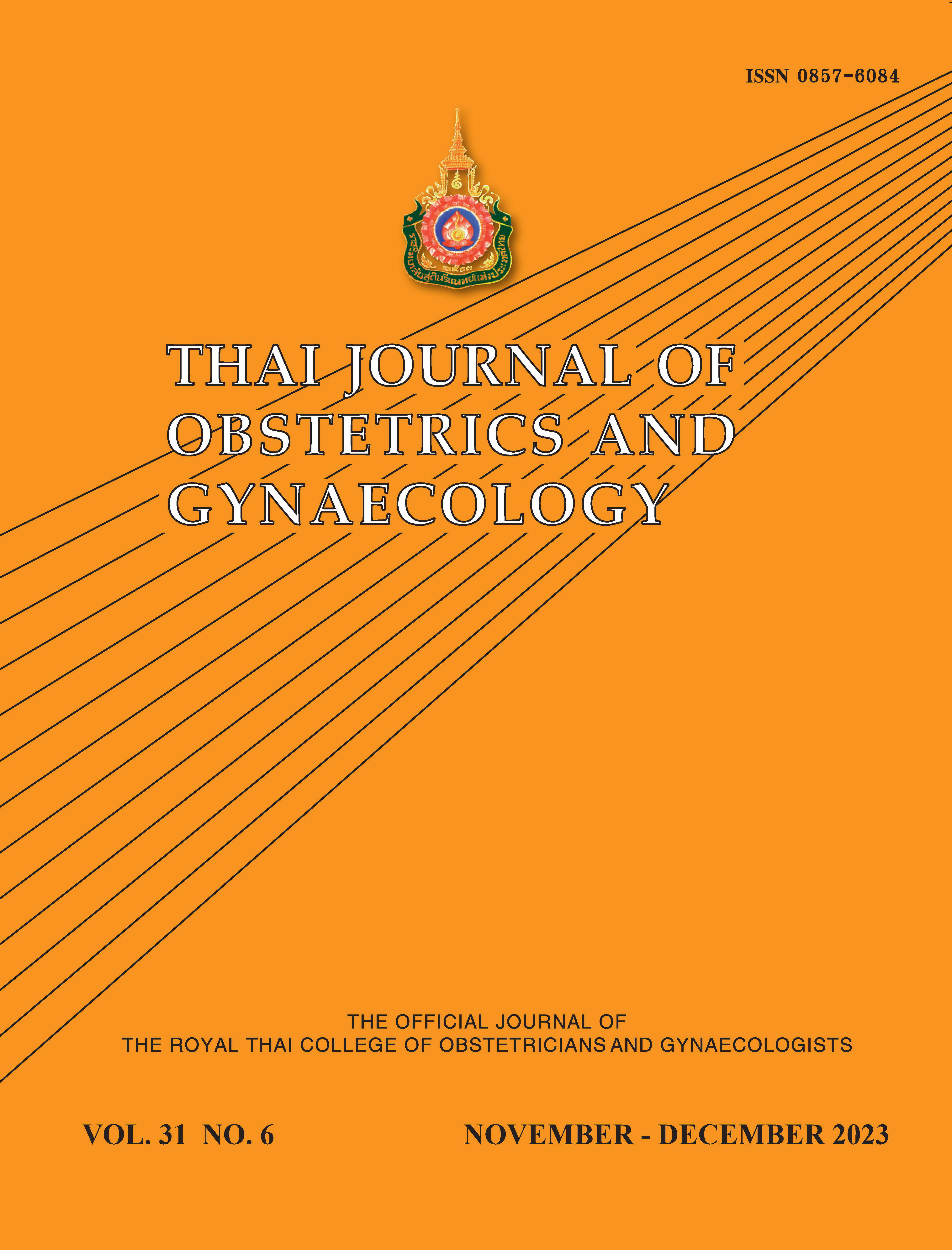Sleep Quality and Associated Factors during Pregnancy
Main Article Content
Abstract
Objectives: To assess the prevalence of poor sleep quality among Thai pregnant women and associated factors.
Materials and Methods: A multicenter cross-sectional study was conducted between October 2021 and June 2022. The sleep quality was evaluated using the Thai version of the Pittsburgh Sleep Quality Index (T-PSQI). Factors associated with poor sleep quality (T-PSQI score > 5) were determined using logistic regression analyses.
Results: This study included 414 participants. Prevalence of poor sleep quality was 43.2% (95% confidence interval 38.4% to 48.2%). Prevalence of poor sleep quality was the highest among pregnant women in the third trimester (37.6%, 35.3%, and 51.0% for women in the first, second, and third trimesters, respectively). In multivariate analyses, only gestational trimesters were independently associated with poor sleep quality. There were no significant associations between poor sleep quality and maternal age, pre-pregnancy body mass index, or the number of prior conceptions.
Conclusion: Approximately 43% of Thai pregnant women in this study encountered poor sleep quality. The prevalence of poor sleep quality was the highest among pregnant women in the third trimester.
Article Details

This work is licensed under a Creative Commons Attribution-NonCommercial-NoDerivatives 4.0 International License.
References
Bhatia P, Chhabra S. Physiological and anatomical changes of pregnancy: Implications for anaesthesia. Indian J Anaesth. 2018 Sep;62(9):651-657.
Bourjeily G. Sleep disorders in pregnancy. Obstet Med. 2009 Sep;2(3):100-6.
Micheli K, Komninos I, Bagkeris E, Roumeliotaki T, Koutis A, Kogevinas M, Chatzi L. Sleep patterns in late pregnancy and risk of preterm birth and fetal growth restriction. Epidemiology. 2011 Sep;22(5):738-44.
Tsai SY, Lin JW, Wu WW, Lee CN, Lee PL. Sleep Disturbances and Symptoms of Depression and Daytime Sleepiness in Pregnant Women. Birth. 2016 Jun;43(2):176-83.
Bartels HC, Kennelly MA, Killeen SL, Lindsay KL, Crowley RK, McAuliffe FM. An mHealth-Supported antenatal lifestyle intervention may be associated with improved maternal sleep in pregnancy: Secondary analysis from the PEARS trial. BJOG. 2022 Jul 25.
Knutson KL. Sociodemographic and cultural determinants of sleep deficiency: implications for cardiometabolic disease risk. Soc Sci Med. 2013 Feb;79:7-15.
Sitasuwan T, Bussaratid S, Ruttanaumpawan P, Chotinaiwattarakul W. Thai version of the Pittsburgh Sleep Quality Index (T-PSQI) developed by Sitasuwan et al (7). J Med Assoc Thai. 2014 Mar;97 Suppl 3:S57-67.
Buysse DJ, Reynolds CF 3rd, Monk TH, Berman SR, Kupfer DJ. The Pittsburgh Sleep Quality Index: a new instrument for psychiatric practice and research. Psychiatry Res. 1989 May;28(2):193-213.
Sedov ID, Cameron EE, Madigan S, Tomfohr-Madsen LM. Sleep quality during pregnancy: a meta-analysis. Sleep Med Rev. 2018 Apr;38:168-176.
Yang Y, Li W, Ma TJ, Zhang L, Hall BJ, Ungvari GS, Xiang YT. Prevalence of poor sleep quality in perinatal and postnatal women: a comprehensive meta-analysis of observational studies. Front Psychiatry. 2020 Mar 13;11:161.
Zhang H, Li P, Fan D, Wu S, Rao J, Lin D, Huang Q, Liu Z. Prevalence of and risk factors for poor sleep during different trimesters of pregnancy among women in china: a cross-sectional study. Nat Sci Sleep. 2021 Jun 17;13:811-820.
Jemere T, Getahun B, Tadele F, Kefale B, Walle G. Poor sleep quality and its associated factors among pregnant women in Northern Ethiopia, 2020: A cross sectional study. PLoS One. 2021 May 4;16(5):e0250985.
Yasaratne D, Deen A, Anuththara T, De Silva D, Ratnayake C, Kandauda C, Undugodage C. Factors associated with poor sleep quality and excessive daytime sleepiness in late pregnancy: A pilot study in an antenatal unit. Sri Lanka J Obstet Gynaecol 2022, 44(1), pp.26–35.
Tang Y, Dai F, Razali NS, Tagore S, Chern BSM, Tan KH. Sleep quality and BMI in pregnancy- a prospective cohort study. BMC Pregnancy Childbirth. 2022 Jan 27;22(1):72.
Smyka M, Kosińska-Kaczyńska K, Sochacki-Wójcicka N, Zgliczyńska M, Wielgoś M. Sleep Problems in Pregnancy-A Cross-Sectional Study in over 7000 Pregnant Women in Poland. Int J Environ Res Public Health. 2020 Jul 23;17(15):5306.
Luyster FS, Choi J, Yeh CH, Imes CC, Johansson AE, Chasens ER. Screening and evaluation tools for sleep disorders in older adults. Appl Nurs Res. 2015 Nov;28(4):334-40.
Doi Y, Minowa M, Uchiyama M, Okawa M, Kim K, Shibui K, Kamei Y. Psychometric assessment of subjective sleep quality using the Japanese version of the Pittsburgh Sleep Quality Index (PSQI-J) in psychiatric disordered and control subjects. Psychiatry Res. 2000 Dec 27;97(2-3):165-72.
Farrahi Moghaddam J, Nakhaee N, Sheibani V, Garrusi B, Amirkafi A. Reliability and validity of the Persian version of the Pittsburgh Sleep Quality Index (PSQI-P). Sleep Breath. 2012 Mar;16(1):79-82.
Sohn SI, Kim DH, Lee MY, Cho YW. The reliability and validity of the Korean version of the Pittsburgh Sleep Quality Index. Sleep Breath. 2012 Sep;16(3):803-12.
Fernández-Cruz KA, Jiménez-Correa U, Marín-Agudelo HA, Castro-López C, Poblano A. Proposing the Clinical inventory of sleep quality. Sleep Sci. 2016 Jul-Sep;9(3):216-220.


